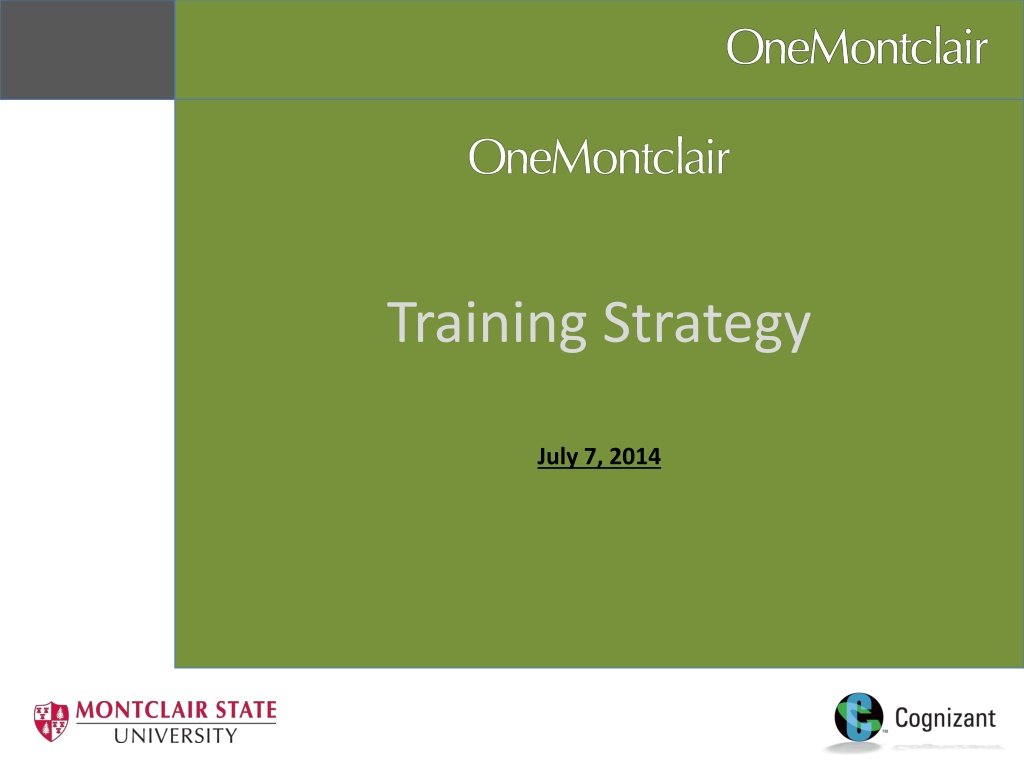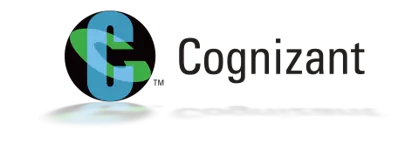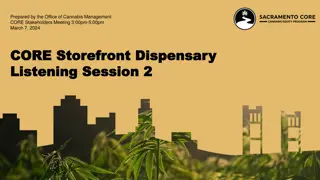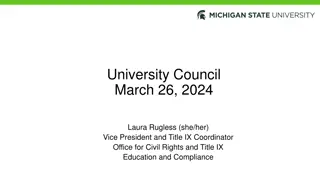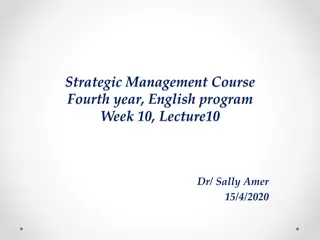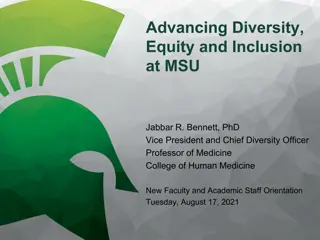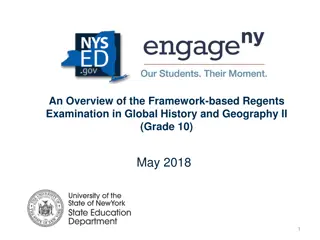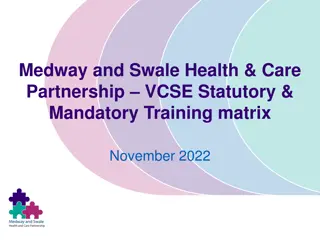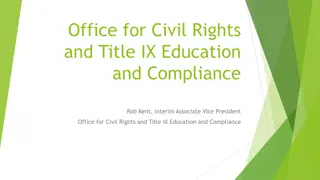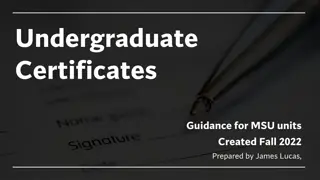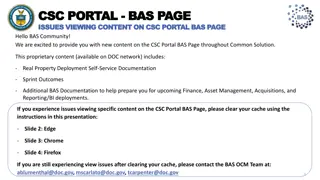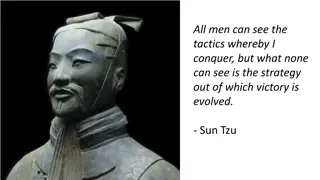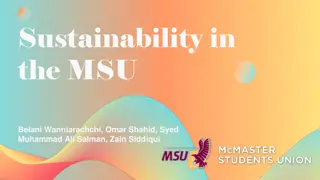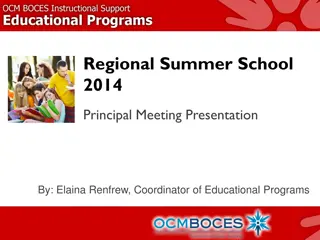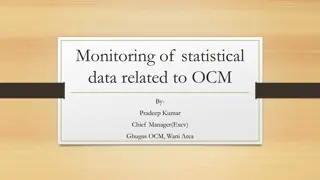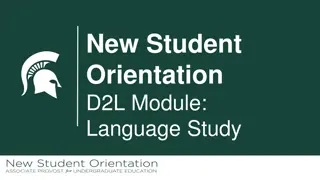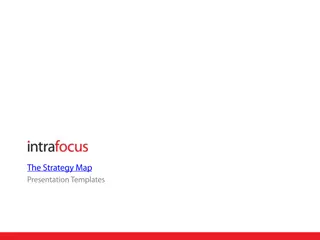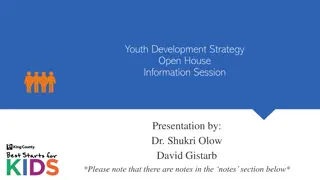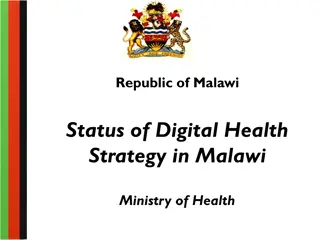MSU OCM Training Framework and Strategy Overview
Explore the training framework and strategy for MSU OCM, focusing on elements such as training needs assessment, lifecycle management, knowledge transfer, and objectives like preparing business users and project teams. The content emphasizes the importance of training in minimizing performance dips, managing change, and enhancing project success. Delve into strategies to address issues like IT problems, change resistance, and inadequate sponsorship based on industry studies and benchmarks.
Download Presentation

Please find below an Image/Link to download the presentation.
The content on the website is provided AS IS for your information and personal use only. It may not be sold, licensed, or shared on other websites without obtaining consent from the author.If you encounter any issues during the download, it is possible that the publisher has removed the file from their server.
You are allowed to download the files provided on this website for personal or commercial use, subject to the condition that they are used lawfully. All files are the property of their respective owners.
The content on the website is provided AS IS for your information and personal use only. It may not be sold, licensed, or shared on other websites without obtaining consent from the author.
E N D
Presentation Transcript
Training Strategy July 7, 2014
Table of Contents Section Page Training Framework 3 Training Strategy & Needs Assessment 7 Training Lifecycle Management 11 Knowledge Transfer 19 Appendix A: Assumptions 25 2
Training Objectives Training Objective 1: Prepare Affected Business Users Business users will need to know what to do (the new business processes) and how to perform those tasks in the new system Training will minimize the performance dip caused by lack of familiarity with new processes and systems Training Delivery Time Performance Reduced performance dip Managed Change Unmanaged Change Go-Live *Source: Prosci s 2009 Benchmarking Report 4
Training Objectives Training Objective 2: Prepare Project Team MSU project team members need to have the knowledge and skills necessary to successfully implement and support the new business processes and system Knowledge Transfer will manage the transition of skills from Cognizant to their project team counterparts OCM Issue 82% 72% Non-OCM Issue 65% 54% 46% 44% 44% 43% 41% 36% IT problems Silos Scope expansion No change management Resistance to change Project team skills Project management Business case issues Inadequate sponsorship Unrealistic expectations *Source: Deloitte Consulting study of Fortune 500 ERP failures 5
Training Framework The Training component of the MSU OCM Framework has three elements: Training Strategy & Needs Assessment The vision for how end-user training will be performed, along with an initial assessment of the training needs of each group. Training Lifecycle Management Design, development, and delivery of training courses, including assessment of session attendees. Knowledge Transfer How project team subject matter experts will be prepared for their involvement in the project, and their roles after Go-Live. 6
TRAINING STRATEGY & NEEDS ASSESSMENT 7
Strategy & Needs Assessment The Training component of the MSU OCM Framework has three elements: Training Strategy & Needs Assessment The vision for how end-user training will be performed, along with an initial assessment of the training needs of each group. Training Lifecycle Management Design, development, and delivery of training courses, including assessment of session attendees. Knowledge Transfer How project team subject matter experts will be prepared for their involvement in the project, and their roles after Go-Live. 8
Training Needs Assessment A Training Needs Assessment is performed to identify the high-level scope of training materials development and training delivery needed for a successful training program. A Training Needs Assessment includes: Affected Audience who will be using the new system to perform their job tasks Training Subject an initial assessment of the training subject matter that will need to be covered for each affected training audience (by Oracle module) Audience Size how big of an audience needs to be trained in each major topic This information will be used to inform the Training Curriculum work product during the beginning of Training Lifecycle Management. The Training Needs Assessment has been completed and is included as an attached work product. 9
Delivery Modes OneMontclair Finance training will be delivered via two modes, dependent on the complexity of content and size of student audience. Delivery Mode Description Advantages Disadvantages Most effective training delivery method Availability of personalized attention and Q&A Increased scalability of training delivery to large student audiences Ability to receive training from remote facilities or at the student s desk Additional training logistics requirements for facilities Decreased accessibility for student audiences Scheduled, instructor led training delivered face-to- face in a computer- equipped facility Instructor- Led Classroom Less effective training delivery method Less effective training Q&A Scheduled, instructor led training delivered online via web-enabled technology (e.g., Web-Ex) Virtual Classroom 10
Training Lifecycle Management The Training component of the MSU OCM Framework has three elements: Training Strategy & Needs Assessment The vision for how end-user training will be performed, along with an initial assessment of the training needs of each group. Training Lifecycle Management Design, development, and delivery of training courses, including assessment of session attendees. Knowledge Transfer How project team subject matter experts will be prepared for their involvement in the project, and their roles after Go-Live. 12
Curriculum Design A detailed Course Curriculum will be developed to document the full needs of the OneMontclair Finance training program. This will include: Course Name a unique, brief name for each OneMontclair Finance course Content the course content that will be covered in each course; this content will determine the associated simulations, exercises, and quick reference guides Audience the business roles expected to attend the training course Audience Size the estimated size of the course audience Delivery Mode the manner in which the training content will be delivered to end users (e.g., Instructor-Led or Web-Based Training) Duration the expected duration of the training course (in hours) Sample Training Curriculum 13
Materials Development Training delivery will be executed using the following types of training materials/documentation: Business Process Simulations recordings demonstrating how to perform business process activities in Oracle (performed via UPK See It! functionality) Business Process Exercises prompted business process exercises in a simulated environment (performed via UPK Try It! functionality) Quick Reference Guides short documents providing context or reference information, such as business process documentation Sample UPK Simulation 14
Logistics Planning Training Logistics encompasses the coordination of all the elements necessary for successful training delivery. This includes the following responsibilities: Room Identification & Setup identification of all training facilities, and setup of all necessary computer hardware, software, and connections necessary to enable training content delivery Room Scheduling coordination of training facility availability for each class, based on the size and duration of each course Resource Scheduling scheduling of all training delivery staff (instructors and subject matter experts) for each class Materials Printing printing of any physical training media (e.g., Quick Reference Guides) or assessments (course reaction assessments) for each class 15
Training Assessments After each training course, Reaction (level 1) and Learning (level 2) assessments will be completed by course attendees. The assessment results can be used to track course completion and acquisition of the role s required business process knowledge and Oracle skills. Assessment Level* Assessment Mechanism Assessment Feedback Outputs Description Course attendance Material/delivery improvements System security access permissions Peer coaching or remediation training During Training What participants thought and felt about the training session Post-Training Smile Sheets 1 Reaction Acquisition of the training subject matter (e.g., technical skills) Exercise-Driven Evaluations 2 Learning After Training Application of the training subject matter during job performance Supervisor Observations 3 Behavior Business results generated from job performance improvements Program KPI Metric Tracking ROI Assessments 4 Results *Source: Donald Kirkpatrick course evaluation model (Evaluating Training Programs, 1994) 16
Process & Timeline Stage: Build Test Support Dec Jan Feb Mar Apr May Jun Jul Curriculum Design UAT Training Lifecycle Management Training Materials Development Logistics Planning Training Delivery Activity Description Development of a Training Curriculum to document course content, audience, delivery method, and duration Curriculum Design Development of all training course content, including exercises, quick reference cards (as necessary), and assessments Training Materials Development Coordination of all aspects of training course delivery, including rooms, computers, students, and subject matter experts Logistics Planning Delivery of training course material to students, and analysis of the resulting training course assessments Training Delivery 17
Roles & Responsibilities Role Responsibilities Necessary Capabilities Manage the overall training design, development, and delivery effort Experience in the full lifecycle of training development and delivery for process/technology projects Training Lead Develop training materials Deliver Train-the-Trainer (TTT) sessions to Trainers Course design experience Experience developing materials using the UPK software Training Developers Schedule training courses Prepare training rooms & materials Collect and analyze assessments Access to reserve facilities Detail-oriented and analytical Logistics Coordinator Learn course materials (in TTT) Deliver training to end-users Understands current business processes and systems Communicates clearly Trainers Provide input to training materials Attend training delivery to support Trainers by answering questions Understands the new processes and systems in depth (project SME) SMEs 18
Knowledge Transfer The Training component of the MSU OCM Framework has three elements: Training Strategy & Needs Assessment The vision for how end-user training will be performed, along with an initial assessment of the training needs of each group. Training Lifecycle Management Design, development, and delivery of training courses, including assessment of session attendees. Knowledge Transfer How project team subject matter experts will be prepared for their involvement in the project, and their roles after Go-Live. 20
Needs Identification Knowledge Transfer begins with the identification of the knowledge and skills that each project team member will need to support the project and the business after go-live. Knowledge Skills Abilities The information needed to understand what to do and put the work in appropriate context New business processes Inputs and outputs of each process activity Oracle foundational system knowledge The tool-specific understanding of how to perform the specific job responsibilities/tasks Execution of business processes using Oracle Configuration of Oracle for future updates The competencies required to successfully meet the requirements and objectives of a job Knowledge Transfer will not address staff Ability gaps 21
Knowledge Transfer Plans Once required knowledge and skills are identified, each MSU project team member will have a specific Knowledge Transfer Plan, identifying what knowledge transfer they need, how they will receive it, and who from the implementer will facilitate the acquisition. For each identified knowledge or skill item, the knowledge transfer mechanism will be identified from the following options: Project Team Training formal training provided from a third party (e.g., Oracle functional training courses) Project Team Mentoring partnering between MSU project team member and a corresponding implementer staff member to transfer knowledge and skills via on- the-job mentoring and project implementation activities Documentation Sharing review of project documentation by MSU project team member; implementer staff member will be identified for each documentation topic as a point person for MSU project team member questions 22
Process & Timeline Stage: Design Build Test Support Aug Sep Oct Nov Dec Jan Feb Mar Apr May Jun Jul KT Needs Identification Knowledge Transfer KT Plan Development KT Execution & Tracking Activity Description Determination of what knowledge and skills each MSU project team member will need based on their project role and MSU position Knowledge Transfer Needs Identification Identification of how each knowledge transfer need will be met, including the transfer mechanism (e.g., formal training, coaching, etc.) and which implementer employee will be responsible Knowledge Transfer Plan Development Tracking the performance of knowledge transfer activities and confirming the acquisition of the expected knowledge and skills for MSU staff Knowledge Transfer Execution & Tracking 23
Roles & Responsibilities Role Responsibilities Necessary Capabilities Co-develop KT Plans, focusing on comprehensive coverage across subject areas Track progression of KT Plan against agreed upon timelines Escalate KT gaps and issues Understands the knowledge and skills necessary for MSU project team members Detail oriented enough to identify KT needs and track progress against KT execution Knowledge Transfer Analyst Co-develop KT Plans, focusing on the content in their subject areas Pillar implementer business process or technology specialists Knowledge Holders Fully engage in KT sessions Accept ownership of domain expertise after project close MSU pillar team members Knowledge Recipients Validate knowledge transfer is progressing as expected according to the KT Plan timelines Address any escalated KT gaps Project leadership (sponsors and PMs) within OneMontclair (Executive PMO and Pillar) OneMontclair Pillar & Program Leadership 24
APPENDIX A: Assumptions 25
Assumptions Assumption 1: Baseline Staff Knowledge and Skills The MSU Finance training will be delta training, focusing on training staff on the knowledge and skills that are different from what they currently need to perform their jobs in the new system. This assumes the MSU staff already has the necessary baseline knowledge and skills. Knowledge Skills The information needed to understand what to do and put the work in appropriate context Existing business processes Current MSU business policies Job-specific foundational knowledge (e.g., accounting practices, etc.) The tool-specific understanding of how to perform the specific job responsibilities/tasks Basic computer skills, including mouse and keyboard proficiency Proficiency in using non-Oracle business applications (e.g., Adaptive Planning, etc.) 26
